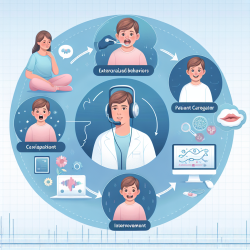Introduction
As a speech-language pathologist dedicated to data-driven decision-making, I am thrilled to share insights from the groundbreaking study, "Improving Children’s Behavior in Seven Sessions: A Randomized Controlled Trial of Parent-Child Care (PC-CARE) for Children Aged 2–10 Years." This study provides compelling evidence for practitioners seeking effective interventions for children with externalizing behaviors.
Understanding PC-CARE
PC-CARE is a 7-session dyadic intervention designed for children aged 2-10 years who exhibit mild to moderate externalizing behavior problems. The intervention focuses on improving children's behaviors, enhancing adaptive skills, and reducing parental stress through positive communication strategies, self-regulation, and behavior management techniques.
Key Findings
- Behavioral Improvements: Families participating in PC-CARE showed significant reductions in children's externalizing behaviors compared to those on a waitlist.
- Enhanced Adaptive Skills: Children in the PC-CARE group demonstrated notable improvements in adaptive skills, such as social skills and functional communication.
- Reduced Parental Stress: Parents reported decreased stress levels, highlighting the intervention's positive impact on the caregiver-child relationship.
- Increased Positive Communication: Caregivers enhanced their use of positive communication skills, fostering better interactions with their children.
Why PC-CARE Works
PC-CARE's effectiveness lies in its structured yet flexible approach, incorporating weekly skill-building, live coaching, and active child involvement. This method not only addresses behavioral issues but also empowers parents with tools to maintain progress.
Implications for Practitioners
For practitioners, integrating PC-CARE into their repertoire offers a brief, effective solution for addressing externalizing behaviors. Its adaptability to various settings, including online platforms like TinyEYE, makes it accessible and appealing to families. By adopting PC-CARE, practitioners can enhance their service delivery, improve client outcomes, and potentially reduce waiting lists.
Encouragement for Further Research
While this study establishes PC-CARE as an evidence-based intervention, further research is encouraged to explore its application across diverse populations and settings. Practitioners are urged to contribute to this growing body of evidence, ensuring the continued evolution of effective child behavior interventions.
To read the original research paper, please follow this link: Improving Children’s Behavior in Seven Sessions: A Randomized Controlled Trial of Parent-Child Care (PC-CARE) for Children Aged 2–10 Years.










